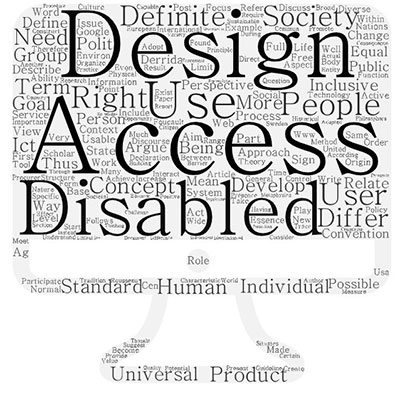Description
 This course will introduce you to practices, theories, and debates concerning the intersections between technology, media, disability, and ableism. It will provide opportunities to critically reflect on how you think about disability and technology and what this means for your educational practice.
This course will introduce you to practices, theories, and debates concerning the intersections between technology, media, disability, and ableism. It will provide opportunities to critically reflect on how you think about disability and technology and what this means for your educational practice.
Digital technology can provide space for disabled people to find community and to reframe how they are represented in various forms of media, including textbooks, but it also provides platforms for reproducing inequity. How might we think about these dilemmas as educators? What does it mean for educational planning and assessment?
Learning Objectives
After completing the course, you will be able to:
- Understand how we come to learn about disability and the ways this influences attitudes, beliefs, values, policies, and practices.
- Critically assess policies and practices around educational technology through the lens of ableism.
- Understand debates surrounding technology and disability.
- Work collaboratively to critique and recommend changes to the design of technologies based on an understanding of how values and beliefs about disability connect to these designs and, more broadly, decisions around what technologies to purchase.
- Work collaboratively to educate others on how discourses around educational technology, media, and disability are interconnected with other forms of structural oppression (e.g. racism).
- Develop a practice grounded in an understanding of “nothing about us without us.”
Activities
This course follows a modular design focused on topics and themes relevant to the course objectives and assigned texts. Required texts (readings and multi-media), course materials, online discussions, and assignments will be completed in an asynchronous format.
Module themes and topics
- Ableism, language, & identity
- Ableism
- ‘People first’ and ‘identity first’ language
- A brief history of disability and technology
- From Tiny Tim to Stephen Hawking
- Normates and Supercrips
- Empowering for whom?
- Intersectionality, disability, and technology
- Disability ethics and disability rights
- Thinking through ethics
- Practices of inclusion or exclusion
- Universal design
- Whose agenda?
Readings & Resources
All course materials will be available online via the Library Online Course Reserve (LOCR) linked to the course navigation menu and/or from hyperlinks to freely available videos and articles online.
Examples
- Bouck, E. C. (2010). Chapter 6: Technology and students with disabilities: Does it solve all the problems. In F. E. Obiakor, J. P. Bakken, & Anthony F. Rotatori (Eds.), Advances in Special Education (Vol.20, pp. 91–104). Emerald Publishing.
- New Day Films. (2013, October 2). FIXED: The science/fiction of human enhancement – New Day Films – Disability – Sociology [Video]. Youtube.
- Janz, H. L., & Stack, M. (2017, August 27). Think disability is a tragedy? We pity you. The Conversation.
- Parsons, S., Yuill, N., Good, J., & Brosnan, M. (2019). ‘Whose agenda? Who knows best? Whose voice?’ Co-creating a technology research roadmap with autism stakeholders. Disability & Society, 35(2), 201–234.
- Ringo, A. (2013, August 9). Understanding Deafness: Not everyone wants to be “fixed.” The Atlantic.
- Wong, A. (Host). (2019, December 18). Cyborgs (No. 66) [Audio podcast episode]. In Disability Visibility Project. Disability Visibility Project.
Assignments & Assessment
- Weekly discussion participation (20%)
We expect weekly participation in discussion groups, which includes your reflections on the weekly readings and resources and your contribution to discussion of the talking point questions each week. We invite responses to at least two other people in the class. Your final grade for participation will be determined by your instructor’s assessment of the quality and presence of your overall contributions and reflections throughout the term.
- Assignment 2: Autobiography: Early memories of disability (30%)
In this assignment, we invite you to think back to how you came to your understanding of disability. You are free to choose how you’d like to tell your story (e.g., essay, podcast, video, short story).
- Assignment 3: Expanding conversations about disability (Group project) (30%)
For this extended and multi-part assignment, you will work in groups of 3-5 people to develop a media product aimed at expanding conversations about disability and technology or counter current common representations concerning disability and technology. It could be:
-
-
- A module focusing on disability, ableism, and technology for your workplace or students
- A professional development workshop on disability, ableism, and technology
- A video
- A podcast
- A resource site
- An educational website
- A game
- ….or we welcome other ideas you may have.
-
This project is not just about a final product but the conversations you engage in through the process of creating the product.
- Reflecting on what you learned (20%)
The purpose of this assignment is to draw from the course (including readings, discussions, and the group assignment) and your lived experiences to reflect on your learning throughout the course. We would also like you to think about where you go from here with your learning.
Minor course topic, activity, reading/resource, and assignment details may change from year to year.